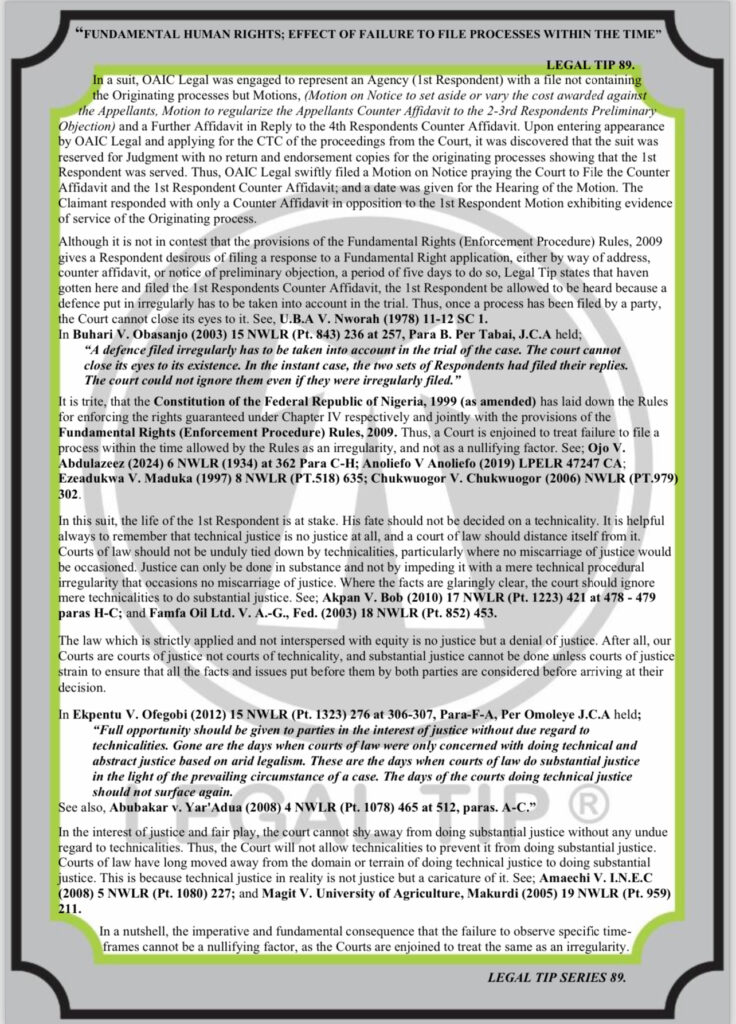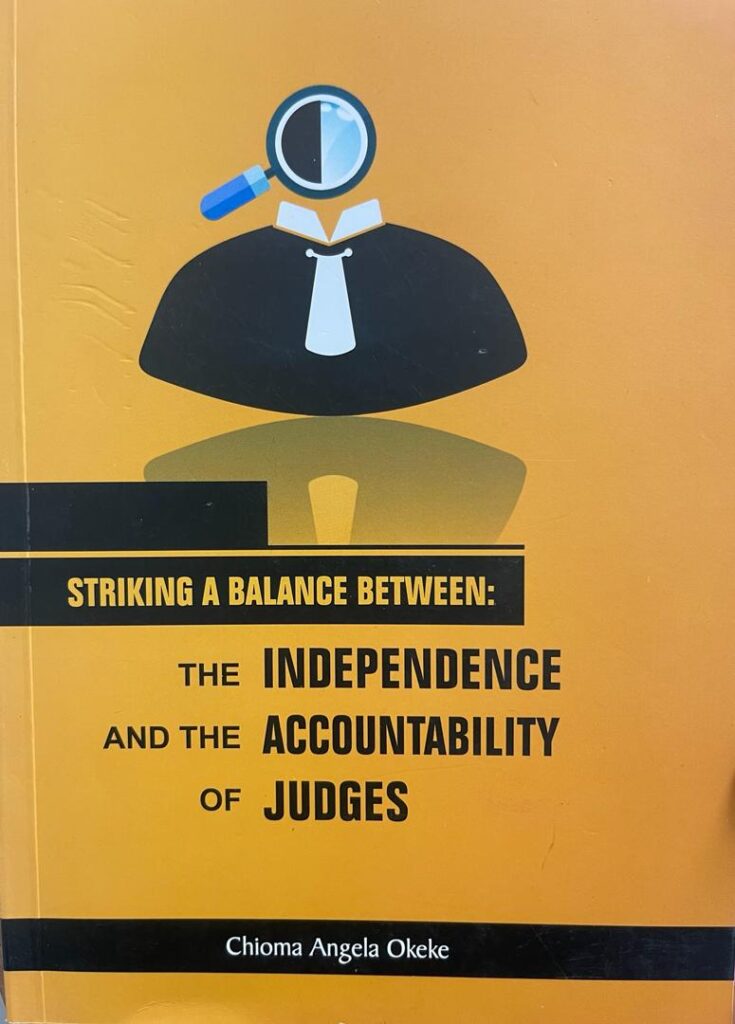
”FUNDAMENTAL HUMAN RIGHTS; EFFECT OF FAILURE TO FILE PROCESSES WITHIN THE TIME”
LEGAL TIP 89.

In a suit, OAIC Legal was engaged to represent an Agency (1st Respondent) with a file not containing the Originating processes but Motions, (Motion on Notice to set aside or vary the cost awarded against the Appellants, Motion to regularize the Appellants Counter Affidavit to the 2-3rd Respondents Preliminary Objection) and a Further Affidavit in Reply to the 4th Respondents Counter Affidavit. Upon entering appearance by OAIC Legal and applying for the CTC of the proceedings from the Court, it was discovered that the suit was reserved for Judgment with no return and endorsement copies for the originating processes showing that the 1st Respondent was served. Thus, OAIC Legal swiftly filed a Motion on Notice praying the Court to File the Counter Affidavit and the 1st Respondent Counter Affidavit; and a date was given for the Hearing of the Motion. The Claimant responded with only a Counter Affidavit in opposition to the 1st Respondent Motion exhibiting evidence of service of the Originating process.
Although it is not in contest that the provisions of the Fundamental Rights (Enforcement Procedure) Rules, 2009 gives a Respondent desirous of filing a response to a Fundamental Right application, either by way of address, counter affidavit, or notice of preliminary objection, a period of five days to do so, Legal Tip states that haven gotten here and filed the 1st Respondents Counter Affidavit, the 1st Respondent be allowed to be heard because a defence put in irregularly has to be taken into account in the trial. Thus, once a process has been filed by a party, the Court cannot close its eyes to it. See, U.B.A V. Nworah (1978) 11-12 SC 1.
In Buhari V. Obasanjo (2003) 15 NWLR (Pt. 843) 236 at 257, Para B. Per Tabai, J.C.A held;
“A defence filed irregularly has to be taken into account in the trial of the case. The court cannot close its eyes to its existence. In the instant case, the two sets of Respondents had filed their replies. The court could not ignore them even if they were irregularly filed.”
It is trite, that the Constitution of the Federal Republic of Nigeria, 1999 (as amended) has laid down the Rules for enforcing the rights guaranteed under Chapter IV respectively and jointly with the provisions of the Fundamental Rights (Enforcement Procedure) Rules, 2009. Thus, a Court is enjoined to treat failure to file a process within the time allowed by the Rules as an irregularity, and not as a nullifying factor. See; Ojo V. Abdulazeez (2024) 6 NWLR (1934) at 362 Para C-H; Anoliefo V Anoliefo (2019) LPELR 47247 CA; Ezeadukwa V. Maduka (1997) 8 NWLR (PT.518) 635; Chukwuogor V. Chukwuogor (2006) NWLR (PT.979) 302.
In this suit, the life of the 1st Respondent is at stake. His fate should not be decided on a technicality. It is helpful always to remember that technical justice is no justice at all, and a court of law should distance itself from it. Courts of law should not be unduly tied down by technicalities, particularly where no miscarriage of justice would be occasioned. Justice can only be done in substance and not by impeding it with a mere technical procedural irregularity that occasions no miscarriage of justice. Where the facts are glaringly clear, the court should ignore mere technicalities to do substantial justice. See; Akpan V. Bob (2010) 17 NWLR (Pt. 1223) 421 at 478 – 479 paras H-C; and Famfa Oil Ltd. V. A.-G., Fed. (2003) 18 NWLR (Pt. 852) 453.
The law which is strictly applied and not interspersed with equity is no justice but a denial of justice. After all, our Courts are courts of justice not courts of technicality, and substantial justice cannot be done unless courts of justice strain to ensure that all the facts and issues put before them by both parties are considered before arriving at their decision.
In Ekpentu V. Ofegobi (2012) 15 NWLR (Pt. 1323) 276 at 306-307, Para-F-A, Per Omoleye J.C.A held;
“Full opportunity should be given to parties in the interest of justice without due regard to technicalities. Gone are the days when courts of law were only concerned with doing technical and abstract justice based on arid legalism. These are the days when courts of law do substantial justice in the light of the prevailing circumstance of a case. The days of the courts doing technical justice should not surface again.
See also, Abubakar v. Yar’Adua (2008) 4 NWLR (Pt. 1078) 465 at 512, paras. A-C.”
In the interest of justice and fair play, the court cannot shy away from doing substantial justice without any undue regard to technicalities. Thus, the Court will not allow technicalities to prevent it from doing substantial justice. Courts of law have long moved away from the domain or terrain of doing technical justice to doing substantial justice. This is because technical justice in reality is not justice but a caricature of it. See; Amaechi V. I.N.E.C (2008) 5 NWLR (Pt. 1080) 227; and Magit V. University of Agriculture, Makurdi (2005) 19 NWLR (Pt. 959) 211.

In a nutshell, the imperative and fundamental consequence that the failure to observe specific time-
frames cannot be a nullifying factor, as the Courts are enjoined to treat the same as an irregularity.
LEGAL TIP SERIES 89
